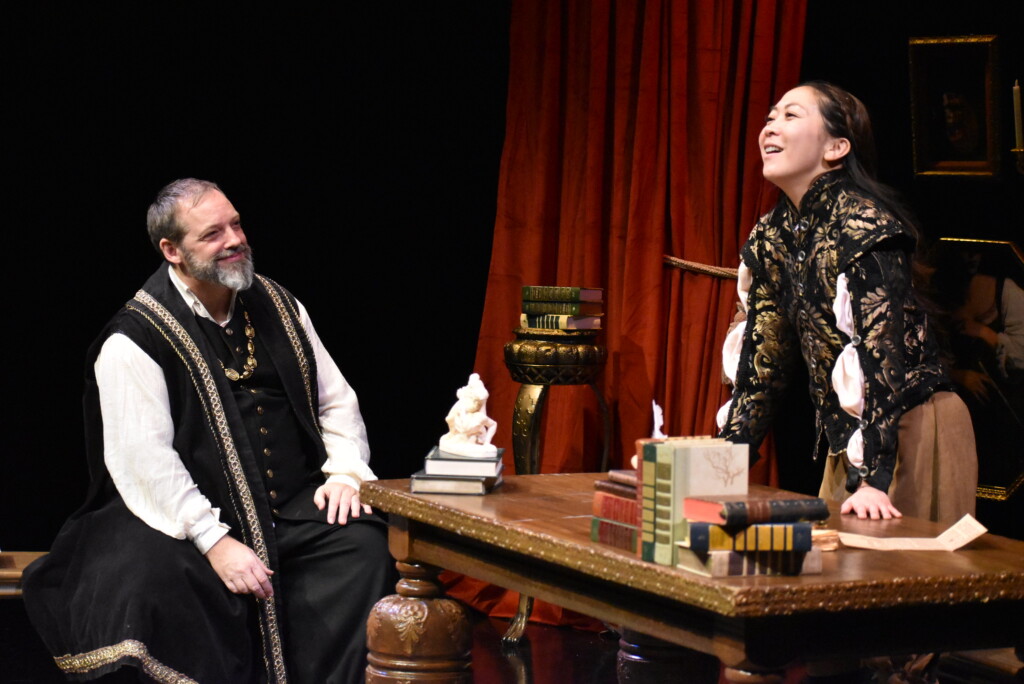Plan-B Theatre’s world premiere production of Debora Threedy’s Balthazar is a crown jewel of intimate chamber theater, in every measure. Directed by Cheryl Ann Cluff, the 70-minute production is gratifying in the finest sense, with Threedy’s well-grounded fanfiction take on Shakespeare’s The Merchant Of Venice, the ebullient elegance of Lily Hye Soo Dixon and Jason Bowcutt in the roles of Portia and Bellario, respectively, and the outstanding sensory effects of Janice Chan’s Venetian set design and Cluff’s selection of music to convey the Elizabethan Age in its finest humanistic splendor.
Dixon and Bowcutt give splendid justice to the script. They acknowledge the underlying creative drivers which inspired Threedy, a retired University of Utah law professor, to pen this intelligent and gently provocative take on equity not only in the courtroom but also in the broader world where one’s gender or sexual identity should never be subjected to constraints in pursuing the careers or relationships that matter most to them.
As mentioned in a preview at The Utah Review, Threedy follows the gist of the original play’s storyline, including Portia’s disguise in male clothing to pursue her first trial as a lawyer. Bellario is mentioned in the Shakespeare original but is never on stage. In Threedy’s play, Bellario also is trying to keep his secret and personal affairs as discreet as possible: he is gay and has a lover.

Photo Credit: Sharah Meservy.
Already on opening night, Dixon and Bowcutt set a near-perfect rhythm in their respective performances. Bellario is committed to following the details of the will that Portia’s father left but inevitably Portia, with exquisite finesse, steers her cousin to recognize and respect her earnest desires to enter the legal profession. While Bellario mentors Portia, who is a quick learner in the intricacies of the law that sits at the heart of the case she will try, Portia guides Bellario to his own epiphany about living fully and comfortably in his own identity. Certainly, the most meaningful education relationships are symmetrical and reciprocal and Balthazar sets a prime standard in this dimension.
The Shakespearean canon is as good a cornerstone for building a foundation of a fully rounded education as possible. And, The Merchant of Venice’s interior sociopolitical and sociocultural structure is uniquely flexible to spawn Balthazar, with relevant contemporary sensibilities while preserving the Elizabethan Age feel and look of the original.
As a professor, Threedy encountered students whose frames of perspectives evolved from one generation to the next and how they became emboldened to muse and postulate about Shakespearean characters such as Portia, Shylock, Antonio and Bassanio. Of course, in the original, Portia is happily married to Bassanio, Shylock has been subjected to the justice he deserved and Antonio has been spared death. Balthazar shades these outcomes with very credible musings that propel this 2024 adaptation without a hitch. For example, a contemporary reader could turn to lines early in Shakespeare’s first act of The Merchant of Venice, which could lead one to surmise that Antonio loves Bassanio.

Photo Credit: Sharah Meservy.
Many audience members will feel comfortable with Balthazar’s empathetic provocations, which encourages reading beyond the original text and projecting precisely the types of conversations Portia and Bellario carry on in the script. This establishes the crux of the two actors’ outstanding performances. At the end of Balthazar, one truly hopes that the world Threedy has imagined for Portia and Bellario is still possible today, where our worst injustices and absurd prejudices can finally be eradicated.
The production continues its run through March 3 at the Studio Theatre in the Rose Wagner Center for Performing Arts. The play was developed as part of Plan-B’s Lab and Script-In-Hand Series and Words Cubed at the Utah Shakespeare Festival. Please click the Plan-B Theatre website for further details and tickets.
